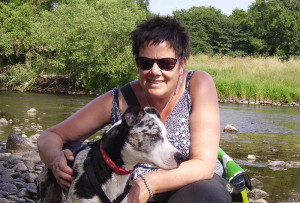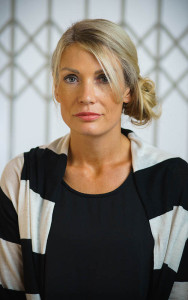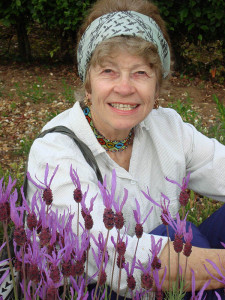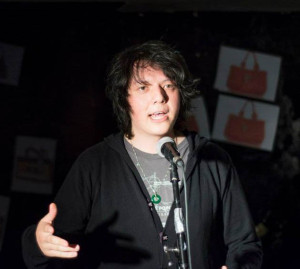We are delighted to announce the Winner of the 2015 Cafe Writers Open Poetry Competition, judged by Tiffany Atkinson, is Suzanne Batty with her poem Horse therapy.
[Scroll down for Tiffany’s judge’s report]
Horse therapy
I watch my twin ride a horse
her arms still strong enough to be contrary
she won’t be led but canters round a barn
full of crippled teenagers she wants nothing to do with.
I sit at the edge on a fold-up chair grinding sawdust
under my unfashionable shoes, pulling at my short brown dress.
Suddenly, with a toss of her head, my twin gallops
out of the barn into another country.
Swallows turn to parakeets as she enters a forest
followed by flocks of children screaming salud! salud!
trying to touch her feet. Deeper in, her ears can still hear
jaguars roar as they devour the unclean. Her horse
could throw her but instead it chases butterflies
cut from the blue electric mountain –
if you press them to your face they smell of sulphur.
In a clearing women are frying fish, filling buckets
with pisco sour. They lift my twin down, make her crutches
from sticks, hand her a bucket in which she finds
my severed head. I have those ugly pigtails, that crooked fringe.
My twin decides to take me home, keep me in the compost heap –
she wants my skull pure and clean she wants its devotion.
She’ll shrink it, hang it on the handle of her wheelchair,
its jaw opening and shutting, what it always says to her –
yes.
Suzanne Batty : Horse Therapy is taken from my collection in progress: States of Happiness. I won the Poetry Society’s inaugural Ann Born prize in 2013 and had the good fortune to have Penelope Shuttle as my mentor during the writing and rewriting of it. My first collection The Barking Thing was published by Bloodaxe in 2007. I have been teaching creative writing for many years. I’m currently living in York and enjoying living somewhere quieter than my usual home in Manchester.
2nd Prize Winner: Pat Winslow

Living on Trap Street
A police motorcyclist crashed through a wall.
We’d never seen such a machine before,
didn’t know about radios and fluorescent jackets.
We held him for 27 days and nights,
fed him on soup and bread and lard.
It’s good enough for us we said.
We watched him climb over our roofs.
‘This is not my time,’ he yelled. ‘I have proof.
We live shiny lives. Yours is cobbles
and horse muck. Your sash windows rattle.’
It’s true. A man comes each evening to light the lamps.
Our houses are close together and cold and damp.
Men heave sacks of coal and women haul wet laundry
onto lines that run between our houses on windy days.
Our winter fogs are yellow and burn like mustard.
Our lives are slow and steady and often hard.
It’s been 1913 since I can remember.
I’m the same age I was last year.
‘You were just a mapper’s trick,’ he said.
‘A copyright cul-de-sac.’
Were, he said, not are.
The future frightens me even more.
Pat Winslow worked for twelve years as an actor before leaving the theatre in 1987. She has published seven collections, most recently, Kissing Bones with Templar Poetry. For more information, see http://www.patwinslow.com/ and http://thepatwinslow.blogspot.co.uk/
3rd Prize Winner: Elisabeth Sennitt Clough
Heruvim
For Ana
You were one term
at our primary: a small green-eyed girl
whose mother shrugged and smiled
and said, oh, I forgot about you,
the day our teacher walked you home.
The England of your mother’s dreams
inspired such diversions. Red lipstick
and dancing: how unapologetic
the skim of her skirt, each move
inching the hem higher.
They said your mother climbed in the bottle
at the end. She had ship ambitions:
the fold and rig through a narrow throat,
all her body a galleon, her arms pinned
to the prow, breasts loud and bare
no doubt, cannons set for war.
Years later, I would see you once more
outside a row of shops on the edge of town.
You were fourteen, maybe fifteen, pushing
a blue buggy. Mummy’s angel, you said
widening your arms like a horizon,
I’ve got you.
Elisabeth Sennitt Clough lives in Norfolk with her husband and three children. Her poems deal mainly with themes of trauma and domestic violence. She considers Sharon Olds, Pascale Petit, Helen Ivory and Dorianne Laux among her influences. www.elisabethsennittclough.co.uk
The Norfolk Prize Winner: Sally Festing
Weeding
after the labours of the month on the Norman font in St Mary’s Church, Burnham Deepdale
It’s a dream that rushes out of him
as he weeds, out of mindless repetition,
the strange life, day after day, June-time
when he’d rather riddle mussels, wash whelks,
or row offshore in his matchstick boat
to follow a silver slick.
Rather catch with a net, bait, hook or basket.
He longs for the tug of a mackerel.
Itches to slit the fish.
The sea is a lodestone.
He lusts for its fat green squeeze,
water bouncing beneath the wood,
oars dipping out and in and out
of its depths. That’s when he dreams
of flesh and shell and bone. Some days,
for hours, he finds his face in the water’s surface,
wanting to have this other life.
Not to be always the same.
Childhood holidays on the North Norfolk coast may explain Sally Festing’s lifelong passion for exploring the links between people, art and landscape. Her previous pamphlets are Swimming Lessons (Cidesterna) and Salaams (Happenstance). An illustrated pamphlet, Font; and a collection, Doors Opening, (Oversteps) are being published this year. She runs Saltmarsh Poetry from her home in the Burnhams. She as written radio4 plays based on poem sequences, books on fishermen, showmen, lavender and animals in the 18th century; Penguin biographies of Hepworth and Jekyll, and widespread journalism.
Funnest Poem: Winner Sean Wai Keung
+ so i said to the guy what do you
mean you dont sell poems this
is a bookshop you should sell poems
+ he said sorry but poems
just dont really sell but we do sell
shakespeare we actually have a
discount on the collected works of
shakespeare right now + i said
that is not right at all + he said
do you mean right as in correct
or right as in morally acceptable
+ i said i just want some poems
why are there no poems in this city + he said
why are you crying sir why are you crying
do you want me to get in trouble with my manager
Sean Wai Keung is a Norwich-based poet currently studying on the Poetry MA at the University of East Anglia. His work has previously been featured in Lunar Poetry, Ariadne’s Thread and The Suburban Review. He enjoys performing his poems and in 2013 he was awarded the Farrago Zoo Award for Best Debut Performance, before going on to represent the winning England team in the 2014 Dylan Thomas in Fitzrovia annual Slam. He currently organises poetry and performance events across the country. Follow him at JellyfishArePoemsToo.tumblr.com
The Commended Poets:
A Peregrine Falcon in Norwich Cathedral… – Sue Burge is a writer and freelance tutor based in King’s Lynn. She teaches creative writing and film studies throughout the region. Her poetry has been published in a wide variety of magazines and e-zines including Mslexia, The North, Stride, Ink, Sweat and Tears, Brittle Star and The Literary Bohemian.
If I were You I wouldn’t start from here – Sam Burns is a Cardiff-born playwright. Her work includes Two Bears for Sixty-Six Books at the Bush Theatre and Amnesty in Agent 160 Presents Agent 160. Her first full-length play, Not the Worst Place, was produced by Paines Plough in April-May 2014. She lives in the Shetland Islands.
Icing Down – U.S.-born retired psychotherapist, Wendy Klein is published in many magazines and anthologies. Winner of the Cinnamon Press Single Poem Competition 2015, she has two collections from Cinnamon Press: Cuba in the Blood (2009) and Anything in Turquoise (2013) with a third, Mood Indigo, due from Oversteps in spring 2016.
O Odonata – Bookseller Mary Anne Smith lives in Canterbury. She has been shortlisted for Canterbury Festival Poet of the Year, and won third prize for prose in a SaveAs Writers International Competition. Her book-themed poem was one of four chosen to accompany a film shown at the 2013 Wise Words festival.
Emily Has Sellotaped All of Us to the Fridge Again – Harry Man was born in 1982 in Aylesbury. His pamphlet, Finders Keepers written in collaboration with the artist Sophie Gainsley is published by Sidekick Books. He is a poet in residence at StAnza Poetry Festival 2016. He lives in Middlesbrough, North Yorkshire.
A Short History of the Cold War – Jonathan Pinnock is the author of the novel Mrs Darcy Versus the Aliens (Proxima, 2011), the short story collection Dot Dash (Salt, 2012) and the bio-historico-musicological-memoir thing Take it Cool (Two Ravens Press, 2014). He also writes poetry from time to time. He blogs at www.jonathanpinnock.com and tweets as @jonpinnock.
Multidrop – Peter Wyton has performed his poetry at festivals & arts centres from Penzance to the Kingdom of Fife & from Aldeburgh to the Glens of Antrim. He has had two nominations for the Forward Prize. Has had work in several anthologies including the O.U.P.Book Of War Poetry.
Tiffany Atkinson’s Judge’s Report
It was with pleasure, curiosity and some trepidation that I began reading these poems – almost 2000! – before Christmas. I am a slow reader, so I would grab a handful of entries each morning to read through the day. In every case I felt I was being given an insight into the lives of anonymous poets across the city and beyond, and it is heartening that in the media age that thinks poetry ‘irrelevant’, people in fact turn in their hundreds to poems to articulate their feelings and responses to all manner of situations – from caring for an elderly parent to the terrorist attacks in Paris; from a glimpse of a rare bird to expressions of love or regret that perhaps have yet to be uttered out loud. Maybe the important thing here is not that poems are winning prizes, but that they are being written at all. So it was difficult to reach the final sifting stages. All of the winning poems were ones that snagged my mind after reading, that provoked a productive disturbance, and that demanded to be read again. Each of them surprises, whether through inventive use of form or language, giving a new spin to something familiar, by opening fresh imaginative spaces, or through any combination of these. I would like to thank everybody who took the time to write and send in their poems, and to encourage everyone to keep writing, reading and listening to poetry, and to seek out fellow travellers at Café Writers and beyond. Speak out, make it new, and have the courage to make the language yours.
First Prize – Horse therapy
This poem disturbed me in the all the right ways long after reading. The relationship of the speaker to his or her twin (is the horse-riding twin actual, a projection, an alter-ego?) is left effectively ambiguous. The poem develops almost cinematically, highly imaginatively, through various landscapes and timeframes in its articulation of a difficult and profoundly ambivalent love. ‘Brave’ is an over-used epithet, but one justly earned by this poem.
Second Prize – Living on Trap Street
Through deceptively minimalist half-rhymed couplets, this poem imagines the lives of the inhabitants of a hypothetical street on a 1913 map as it collides with the real world. The final couplet reveals the full horror of the situation without offering any resolution – a perfectly-judged control of tone.
Third prize – Heruvim
The angel of this poem’s title only reveals itself in the final stanza – when the speaker’s erstwhile, half-remembered classmate is observed in a gesture of quiet triumph over troubled circumstances. This moment is framed through careful and imaginative reflection – almost a short story in three neat stanzas.
Commended:
If I were you I wouldn’t start from here
This poem delivers an entire life story through five narrative vignettes. With a lovely ironic tone and some startling detail, each stanza builds around the incidental moments that become the turning points in a life.
O Odonata
In impeccably executed metric and rhymed form, this poem juxtaposes the species names of creatures with their extravagant courting rituals – a musical and courtly love-song for insects.
Icing Down
This poem draws us carefully into the mindset of a traumatised soldier and the stalled, fragmented nature of his perceptions. It culminates in an acute sensory memory, and offers the subtle suggestion of his restored connection with the world again.
Emily Has Sellotaped All of Us to the Fridge Again
A surreal sequence of images gradually reveals itself to be a young child’s drawing of the family. Cleverly avoiding sentimentality, the poem’s attention to bizarre detail produces a vivid and grudgingly affectionate family portrait.
A Short History of the Cold War
This poem carefully unfolds the extended metaphor of a break-up with a ‘cold war’. Each stanza probes the correspondences further, and the final stanza is both unexpected and tender, pushing our expectations of the metaphor further with its telling and clever detail.
Multidrop
This is a marvelous evocation of voice, each stanza revolving around a reference to the increasingly ominous ‘multidrop’. It frames the rhythms of incidental chatter in a way that is both witty and engaging, while giving a real sense of character.
A Peregrine Falcon on Norwich Cathedral Suffers Delusions of Grandeur
A wonderfully gutsy ventriloquism of a famous local predator (though I am not convinced that his grandeur is delusional!), a celebration of wildness in the very midst of the city, ‘red in tooth and claw’.
Norfolk Poem – Weeding
This ekphrastic poem enters the consciousness of an agricultural labourer with intense sensory detail and a wonderful feel for the musicality of language. It sets the worlds of land and sea against each other in a wistful modulation, and gives a vivid sense of the pull of environment on language.
Funniest Poem – [Untitled]
I didn’t know this was going to be a funny poem until the penultimate line, which is a large part of its success. Its cleverly executed turn produced that rare thing, an actual ‘laugh out loud’. Deadpan is hard to pull off, and this poem does it beautifully.



